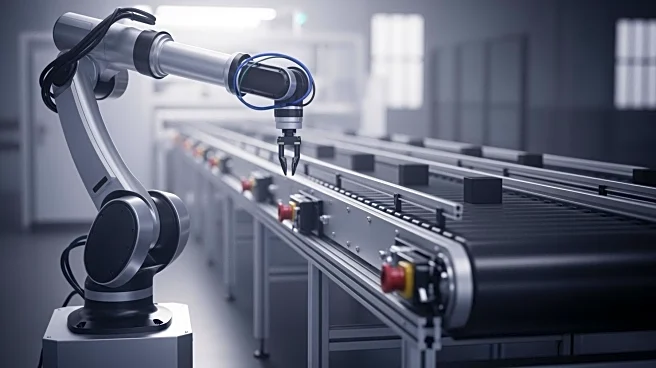What's Happening?
Nestlé, the world's largest food company, has announced plans to cut 16,000 jobs over the next two years as part of a strategic restructuring that includes increased automation. The job cuts will primarily
affect white-collar positions, with 12,000 roles being eliminated, alongside 4,000 positions in manufacturing and supply chain. This decision is part of efforts to improve operational efficiency and reduce costs. The announcement follows a period of managerial turmoil, with new CEO Philipp Navratil replacing former CEO Laurent Freixe. Nestlé's decision comes amid challenges such as U.S. tariffs and changing consumer habits, as the company seeks to adapt to a rapidly evolving market landscape.
Why It's Important?
The job cuts are significant as they reflect Nestlé's efforts to streamline operations and enhance investor confidence amidst rising costs and debt levels. The restructuring is expected to help the company navigate economic headwinds, including U.S. tariffs and fragile consumer confidence. By focusing on operational efficiency and automation, Nestlé aims to maintain its competitive edge in the global food industry. The decision also highlights the broader trend of companies leveraging technology to optimize processes and reduce workforce costs, which could have implications for employment in the sector.
What's Next?
Nestlé plans to continue its strategic reviews of various business segments, including waters and premium beverages, as well as vitamins and supplements. The company is committed to driving growth through innovation and investment in high-potential areas. As Nestlé embarks on this aggressive restructuring, stakeholders will be closely monitoring the impact on sales growth and shareholder value. The company’s ability to successfully implement these changes will be crucial in determining its future trajectory in the competitive food and beverage market.
Beyond the Headlines
The restructuring at Nestlé underscores the ethical and cultural challenges faced by large corporations in balancing efficiency with employee welfare. The rise of automation and AI in business processes raises questions about the future of work and the potential displacement of jobs. Nestlé's decision to cut jobs despite positive sales growth signals a shift towards prioritizing agility and return on investment over traditional business models. This could lead to long-term shifts in corporate strategies across the industry.










